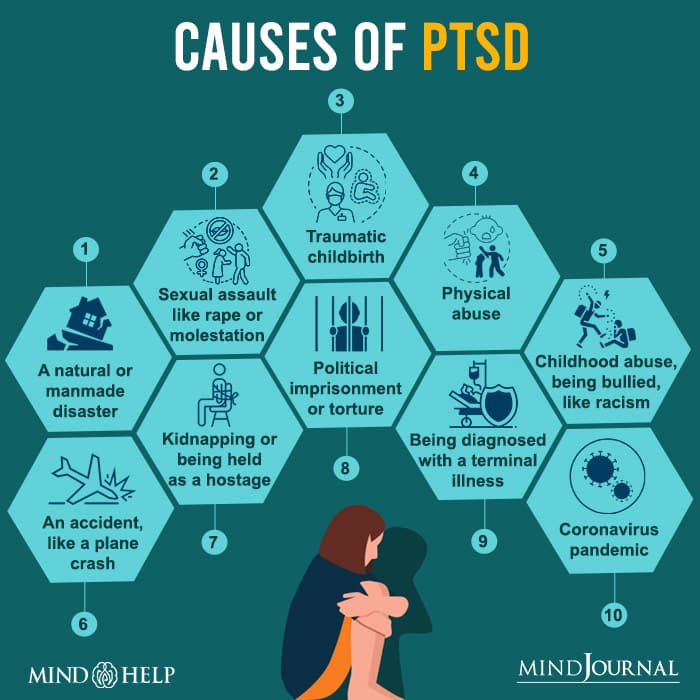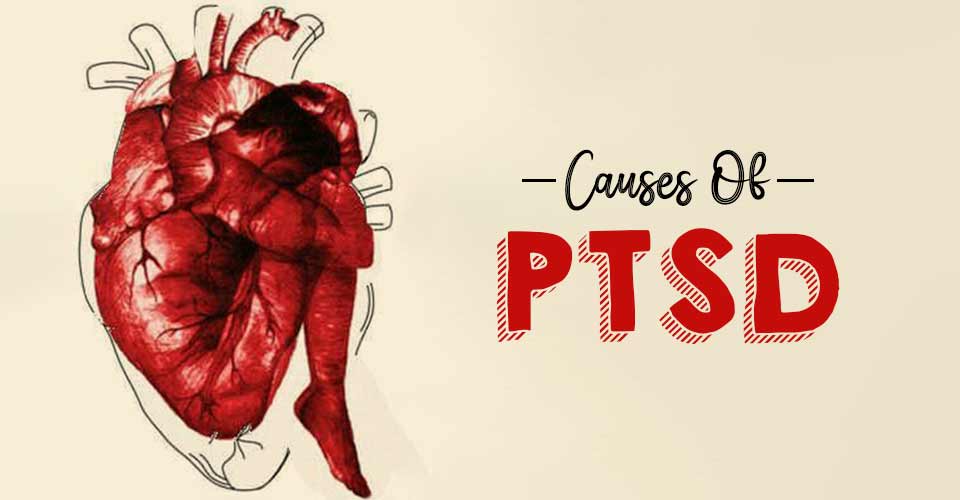Post-traumatic stress disorder (PTSD) affects people directly or indirectly exposed to a traumatic or life-threatening event. The development of PTSD can be attributed to several factors. Let us take a closer look at the potential causes of PTSD.
Table of Contents
Read What Is PTSD Here
Causes of Post-Traumatic Stress Disorder
Often, two people suffer through the same traumatic incident. One of them goes on to develop debilitating PTSD whereas the other is somehow able to carry on with their life without much difficulty. In fact, it is estimated that 1 in every 3 individuals experiencing a traumatic event may be affected by PTSD.
What makes some people more prone to the risk of PTSD than others?
The causes of PTSD are multifactorial – research suggests that a combination of different genetic, psychological, and social factors may determine how likely a person is to develop PTSD after a traumatic event.

1. Biological Factors
Certain genetic and neurobiological traits can be risk factors for PTSD. Some of the biological causes of post-traumatic stress disorder have been further discussed below.
1.1. Genetic vulnerability
Transgenerational 1 Nugent, N. R., Amstadter, A. B., & Koenen, K. C. (2008). Genetics of post-traumatic stress disorder: informing clinical conceptualizations and promoting future research. American journal of medical genetics. Part C, Seminars in medical genetics, 148C(2), 127–132. https://doi.org/10.1002/ajmg.c.30169 and twin studies 2 True, W. R., Rice, J., Eisen, S. A., Heath, A. C., Goldberg, J., Lyons, M. J., & Nowak, J. (1993). A twin study of genetic and environmental contributions to liability for posttraumatic stress symptoms. Archives of general psychiatry, 50(4), 257–264. https://doi.org/10.1001/archpsyc.1993.01820160019002 have attested to the genetic component of PTSD. Post-traumatic stress disorder has been seen to run in some families. Monozygotic twins are also more likely to both succumb to PTSD than dizygotic twins, which further reiterates the importance of genes in the development of this disorder.
Post-traumatic stress disorder also shares several genetic influences commonly seen in different mental health conditions. Generalized anxiety disorder and panic disorder share about 60% genetic similarities with PTSD.
1.2. Brain abnormalities
A smaller hippocampal volume 3 Yamasue, H., Kasai, K., Iwanami, A., Ohtani, T., Yamada, H., Abe, O., Kuroki, N., Fukuda, R., Tochigi, M., Furukawa, S., Sadamatsu, M., Sasaki, T., Aoki, S., Ohtomo, K., Asukai, N., & Kato, N. (2003). Voxel-based analysis of MRI reveals anterior cingulate gray-matter volume reduction in posttraumatic stress disorder due to terrorism. Proceedings of the National Academy of Sciences of the United States of America, 100(15), 9039–9043. https://doi.org/10.1073/pnas.1530467100 has been indicated as a possible biomarker of PTSD, along with changes in the amygdala, anterior cingulate cortex, and other cortical regions. Defects in the immune system 4 Hymie Anisman, Hayley, S., & Kusnecov, A. (2019). The immune system and mental health. London Academic Press. Available from: https://www.sciencedirect.com/book/9780128113516/the-immune-system-and-mental-health can also significantly impact mental functioning, leading to the dysfunction of recovery systems and failure to differentiate between safety and danger. These in turn can act as potential causes of PTSD.
These regions have also been found to be smaller in female sufferers 5 Quidé, Y., Andersson, F., Dufour-Rainfray, D., Descriaud, C., Brizard, B., Gissot, V., Cléry, H., Carrey Le Bas, M. P., Osterreicher, S., Ogielska, M., Saint-Martin, P., & El-Hage, W. (2018). Smaller hippocampal volume following sexual assault in women is associated with post-traumatic stress disorder. Acta psychiatrica Scandinavica, 138(4), 312–324. https://doi.org/10.1111/acps.12920 who experienced childhood physical and sexual abuse.
1.3. Hormone dysfunction
People with PTSD can have abnormally high levels of stress hormones 6 NHS. (2021, February 17). Causes – Post-traumatic stress disorder. Nhs.uk. Available from: https://www.nhs.uk/mental-health/conditions/post-traumatic-stress-disorder-ptsd/causes/ . While adrenaline prepares our body for a flight or fight response and has immense significance for our survival, its effects can be extreme and overwhelming for a person with PTSD. This is considered one of the primary PTSD causes.
2. Psychological Factors
The causes of PTSD may not always be physically discernable. Some of the possible psychological causes of post-traumatic stress disorder have been further discussed below:
2.1. Peritraumatic distress
Research suggests that a high degree of negative emotions 7 Briere, J., Scott, C., & Weathers, F. (2005). Peritraumatic and persistent dissociation in the presumed etiology of PTSD. The American journal of psychiatry, 162(12), 2295–2301. https://doi.org/10.1176/appi.ajp.162.12.2295 during the experience of trauma can be an important predictor of PTSD.
Peritraumatic dissociation, wherein a person mentally dissociates from reality while experiencing a traumatic event, is another phenomenon closely linked with the development of this disorder.
2.2. Personality traits
The way an individual perceives an event is largely dependent on their personality.
Although personality traits cannot exactly be deemed as common causes of PTSD, they can definitely increase the risk of developing the disorder. Certain traits 8 Jakšić, N., Brajković, L., Ivezić, E., Topić, R., & Jakovljević, M. (2012). The role of personality traits in posttraumatic stress disorder (PTSD). Psychiatria Danubina, 24(3), 256–266. such as neuroticism and anxiety have been positively correlated to PTSD whereas extraversion, optimism, and consciousness have been negatively correlated to it.
3. Social and Environmental Factors
Other than the common causes of PTSD discussed above, some other factors that can influence its onset are:
- Lack of social support 9 Guay, S., Billette, V., & Marchand, A. (2006). Exploring the links between posttraumatic stress disorder and social support: processes and potential research avenues. Journal of traumatic stress, 19(3), 327–338. https://doi.org/10.1002/jts.20124
- Adverse childhood experiences 10 Frewen, P., Zhu, J., & Lanius, R. (2019). Lifetime traumatic stressors and adverse childhood experiences uniquely predict concurrent PTSD, complex PTSD, and dissociative subtype of PTSD symptoms whereas recent adult non-traumatic stressors do not: results from an online survey study. European journal of psychotraumatology, 10(1), 1606625. https://doi.org/10.1080/20008198.2019.1606625
- Educational background
- Socioeconomic status
- Cultural and ethnic background
- Family dynamics
Takeaway
The causes of PTSD in adults are not universal. Different factors can make people vulnerable to developing the disorder. Apart from individual differences, certain cultural factors may also influence how a person responds to trauma and copes with it. Additional to the pre-trauma factors, social support and the absence of other stressors can act as protective factors post the traumatic event.
At A Glance
- Identifying post-traumatic stress disorder causes can better inform the course of its treatment.
- The causes of PTSD are multifactorial and can stem from various biological and psychosocial vulnerabilities.
- Some of the biological risk factors for PTSD include genes, hormonal imbalances, and brain structure abnormalities.
- Peritraumatic distress and certain specific personality traits may also make someone more vulnerable to PTSD
- Other environmental risks for PTSD include lack of education, lower socio-economic status, cultural norms, etc.
Frequently Asked Questions (FAQs)
1. Can post-traumatic stress disorder cause memory loss?
The inability to recall specific aspects of a traumatic event is one of the main symptoms of PTSD. This is mainly due to the neurocognitive changes 11 APA PsycNet. (n.d.). Psycnet.apa.org. Retrieved November 21, 2022, from https://psycnet.apa.org/record/2009-04091-005 that occur due to the sudden experience of trauma.
2. Can bullying cause post-traumatic stress disorder?
Although bullying has not been observed to be one of the main causes of PTSD, it can sometimes lead to it. Going through long-term bullying during childhood can especially be a potential cause of complex PTSD.
3. What is the most common cause of PTSD?
Although PTSD can occur due to a large number of reasons, it is most commonly observed in cases of combat exposure and abuse.















